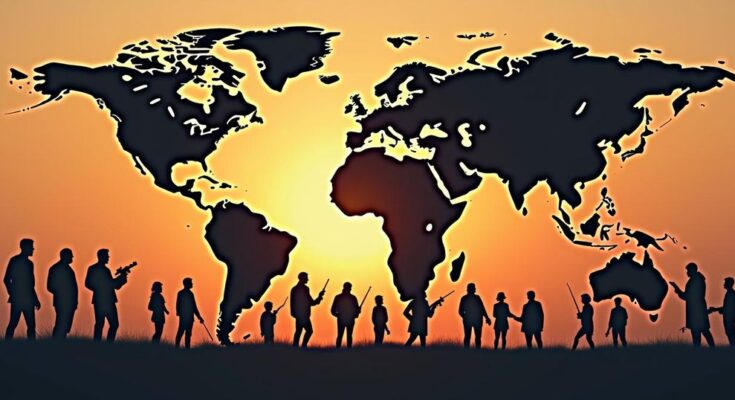The humanitarian crises across Lebanon, the Occupied Palestinian Territories, Syria, Haiti, Ukraine, and Eastern Africa have intensified due to ongoing conflicts and violence. Lebanon reports significant civilian casualties and extensive displacement. The UN expresses serious concerns over security and humanitarian access in the region. Gaza and Syria face severe health system strains, while Haiti grapples with escalating gang violence and Mexico endures constant attacks. Meanwhile, Eastern Africa is confronted with widespread humanitarian needs driven by multiple crises, illustrating the urgent need for international assistance and funding.
The ongoing conflict in Lebanon has had a catastrophic impact on civilians, with the UN Office for the Coordination of Humanitarian Affairs (OCHA) reporting a death toll of approximately 1,700 individuals since October 2023, including 38 health care workers. Furthermore, over 9,000 people are reported to have sustained injuries, while more than 346,000 individuals have been displaced, with estimates suggesting that the total may reach 1 million. More than 155,000 displaced individuals are currently being sheltered in over 800 facilities, many of which are nearing capacity. In addition, the crisis has prompted over 300,000 people, both Lebanese and Syrian, to flee to Syria, underscoring the conflict’s wider regional repercussions. The humanitarian situation is dire, with six hospitals and 40 primary health centers having closed due to airstrikes and infrastructural damage, restricting medical access and humanitarian assistance to affected areas. A US$426 million Flash Appeal has been initiated, with initial pledges appreciated but much more assistance urgently required. The United Nations and its humanitarian partners are ramping up efforts to assist the government-mandated response, providing food, cash assistance, and medical supplies to those in need. In the Occupied Palestinian Territories and Israel, tensions persist, particularly in the West Bank where recent violence resulted in multiple fatalities. In Jaffa, a deadly attack led to the deaths of seven individuals, and operations conducted by Israeli forces in Hebron resulted in further casualties. The OCHA emphasizes the importance of protecting civilians amidst ongoing hostilities, stating that willfully killing civilians is “prohibited and unacceptable”. In Gaza, preparations for a second round of a polio vaccination campaign are underway, alongside ongoing health care provisions despite severe supply shortages due to access constraints. A noted collaboration by the World Health Organization (WHO) has resulted in the deployment of emergency medical teams for trauma care. Syria is also experiencing escalated violence, with airstrikes in Damascus leading to casualties and disruptions in humanitarian activities. The OCHA has cautioned that all combatants must adhere to international humanitarian law to prevent civilian harm. Haiti is witnessing escalating gang violence, resulting in over 700,000 internally displaced individuals, half of whom are children. Humanitarian efforts are ongoing but remain grossly underfunded, with only 39% of necessary funding secured. In Ukraine, civilian areas are bearing the brunt of attacks, particularly in Kherson and Zaporizhzhia, where multiple casualties have been reported, prompting humanitarian support operations. Lastly, in Eastern Africa, around 67 million individuals are in urgent need of aid due to a combination of climate change, conflict, and disease outbreaks, reflecting one of the largest humanitarian crises globally. Despite ongoing assistance efforts, funding shortcomings remain significant, jeopardizing the ability to adequately respond to rising needs.
The article highlights the current humanitarian crises affecting various regions, with a primary focus on Lebanon in light of escalating hostility, which has drastically affected civilians and health infrastructure. The UN’s OCHA compiles and presents the impacts of conflicts in Lebanon, the Occupied Palestinian Territories, Syria, Haiti, Ukraine, and Eastern Africa. Each region is dealing with unique challenges that include loss of life, displacement, shortages of medical care, and the overarching concern of humanitarian funding inadequacies. The statistics provided underscore the urgent need for international assistance.
In summary, the humanitarian situations in Lebanon, the Occupied Palestinian Territories, Gaza, Syria, Haiti, Ukraine, and Eastern Africa are alarmingly critical. Civilians across these regions are experiencing violence, displacement, and a deprivation of essential services. Ongoing international calls for increased humanitarian aid and adherence to international humanitarian law are crucial in alleviating suffering and ensuring protection for affected populations.
Original Source: www.unocha.org




